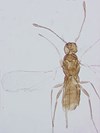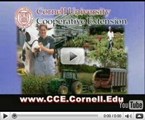Posted 1/31/2012
by Stacey Shackford

Two entomologists in search of one insect have discovered two others: a tiny wasp that hadn't been seen in North America in nearly 100 years, and one that has never been recorded here.
First found in Ithaca, N.Y., in 1915 by Cornell researchers M.D. Leonard and C.R. Crosby, the fairyfly Gonatocerus ovicenatus has not been collected on the continent since then, prompting some European entomologists to question whether it truly was established in North America.
In the picture: The tiny fairyfly Gonatocerus ovicenatus has been found in Geneva after not being seen since its initial discovery by Cornell scientists in 1915.
Posted 1/23/2012
The 4-H Red Cross Babysitting Clinic scheduled for next month is beginning to fill up. Has your young teen signed up yet?
Check out the details!
Posted 1/20/2012
February 25, 9am-12pm
Do you have forested or rural land that you’d like to start an enterprise on but didn’t know your options. Come to this workshop with speakers from Cornell University, landowners and agency representatives to learn about enterprises and programs available.
Topics to be covered include: growing berries in the forest periphery, silvopasture (raising livestock in the forest), growing nut trees, timber harvesting, constructing a wetland, accessing and operating a portable bandsaw, and much more.
The cost is $15pp and $5 for each individual from the same farm or home. This includes all handouts and refreshments. For more information, or to register, contact 607-772-8953.
Posted 1/19/2012
Herriot, a luscious new strawberry, beats out other varieties
Strawberry lovers will soon have Herriot -- a sweet treat featuring a flavor reminiscent of historic varieties and a slight pineapple overtone -- to look forward to, thanks to a new variety of large, heart-shaped fruit developed by Cornell.
Its high yields, vigor, disease resistance and eye appeal should also make it a sweet option for growers, said breeder Courtney Weber, associate professor of horticulture.
"Herriot is one tough plant," said Weber. "Many of our trials are in the worst possible soil conditions, and Herriot is always one of the last varieties standing. And it tastes good, too."
Herriot produces large -- up to 25 grams (a bit more than a half ounce), averaging about 11 grams -- heart-shaped, shiny red berries with a bright green calyx (the berry's green leafy top).
"Herriot really draws the eye because of the nice shine on the fresh berries. That makes them very attractive to farm-stand and pick-your-own customers," Weber said.
In trials and with commercial growers in New York, Massachusetts, Illinois, Minnesota and Ontario, Herriot yielded as much as 60 percent more than Jewel, the predominant midseason variety for perennial matted-row production that was also developed at Cornell.
At the New York State Agricultural Experiment Station in Geneva, N.Y., Herriot harvest consistently began two days before Jewel, blooming in mid-May and avoiding most damaging frosts.
It also shows good resistance to common leaf diseases and holds up well to summer renovation stress (the mowing, fertilizing and loosening of soil to prepare for next year's bed, which can be stressful to the plants), allowing for wider adaptation to variable soils, Weber said.
In development for 12 years, the variety is named for the one of Weber's favorite authors, James Herriot, the author of "All Creatures Great and Small."
Weber's small fruits breeding program at Cornell is focused on developing improved strawberry and raspberry varieties for New York growers. Previous releases -- including L'Amour and Clancy strawberries and Prelude, Encore and Crimson Giant raspberries -- have shown wide adaptation throughout New England, the mid-Atlantic states and the Midwest, as well as temperate regions of Europe.
Weber worked closely with the Cornell Center for Technology Enterprise and Commercialization to license the variety, and a patent will be filed later this year.
Growers interested in trying Herriot this season can purchase plants from the licensed nurseries Krohne Plant Farms <http://www.krohneplantfarms.com>, 269-424-5423) and Daisy Farms <http:/www.daisyfarms.net>, 269-782-6321.
Craig Cramer is a communications specialist in horticulture.
-From the Cornell Chronicle Online
Posted 1/13/2012
January 18, 2012
Presented by Peter Smallidge, NYS Extension Forester, Cornell University Cooperative Extension, Ithaca, NY.
Many woodlot owners and maple producers are interested in better sawtimber production from their land. Ten core best practices will help maple producers or woodland owners improve the volume and value of timber on their property. Participants will learn about principles and strategies related to topics such as: why fast growth is important, the role of foresters and loggers, avoiding high-grading, protecting against timber theft, and good use of the timber tax code.
A request for SAF Continuing Education Credits is pending.
Once registered, you will receive connection details the Tuesday before the webinar.
Download list of other webinars in the series.
Posted 1/4/2012
by Marilyn J. Smith
With today’s four-wheel drive vehicles and cell phone technology, winter travel may seem presumably safe. But drivers can easily encounter dangerous situations with little or no warning. For example, a blinding snowstorm makes the road impassible, so you decide to pull over and wait out the storm. Or what do you do if your vehicle goes off the road?
Assembling a kit of some basic items may help the driver and passengers survive hazardous winter travel. The Federal Emergency Management Agency (FEMA) has made recommendations on things to include in a winter vehicle emergency kit. The kit should contain: blanket or sleeping bag; small shovel; windshield scraper; battery-powered or crank-style radio; flashlight with extra batteries; water; snack food such as candy bars, raisins, dried fruit or granola bars; warm clothes such as insulated coveralls, jacket, hat, gloves, socks and boots; tow chain or rope; tire chains; bag of road salt or sand, or non-skid mats to use for traction if the vehicle is stuck; fluorescent distress flag, a bright bandanna tied to an antenna will work; jumper/booster cables; basic road maps; emergency flares or reflectors; two-way radio, if available; basic first aid kit; two or more day supply of medications; candle, coffee can and matches stored in water-proof container; pocket knife; and basic tools.
The kit can be assembled in a duffle bag, plastic tote, back pack, small suitcase or any container that can be securely closed and is generally waterproof. If possible, store the kit in an easily accessible place in the vehicle so people can access it without having to get out of the vehicle.
Posted 12/21/2011
Recently, rabies activity has been reported in the Norwich area of Chenango County. Since December 12th upwards of six potentially rabid skunks have been identified and removed from the east side of the city. Other areas in New York State are reporting rabies incidents as well, as the unseasonably warm weather has many mammals moving about the landscape. Even if you are not in the Chenango County area, please take the time to review the information below provided by Keith G. Tidball, NY Extension Disaster Education Network (EDEN) of Cornell Cooperative Extension.
To protect yourself, your family, and your pets please take the following precautions:
· Vaccinate your pets for rabies! Pet dogs & cats should be up-to-date on rabies vaccinations & dogs should be wearing current license tags on their collar. For information on rabies vaccination for your pets, please call your local veterinarian or environmental health office.
· If your pet has interaction with any rabies suspect animal DO NOT handle your pet. If you must tend to your pet wear gloves, long sleeves and use extreme caution. You can be exposed to rabies from lingering saliva on a pet’s fur. The pet should be isolated and the saliva allowed to dry, which will kill the virus.
· Keep pets on a leash when outside a fenced yard!
· Enjoy wildlife from a distance. Do not attempt to feed, approach, or touch wild animals. Do NOT kill healthy appearing animals merely due to this warning. If you see a wild mammal acting abnormally*, report it.
· Do NOT trap and relocate skunks! Doing so spreads rabies to other areas. If you have a nuisance animal contact a professional wildlife control agent.
· If you or a loved one is bitten by an animal, wash the exposed site immediately with soap and water & seek medical care. Be sure to report the bite to public health officials.
*Note: Rabid animals may show no fear of people and may even seem friendly. Rabid bats typically fall to the ground where they become accessible to kids and pets.
For more information about rabies please see http://www.health.ny.gov/diseases/communicable/zoonoses/rabies/ .
Posted 12/13/2011
Learn about how to make healthy choices when dining out. Download this useful info sheet. Find more helpful information on the Nutrition & Health page.
Posted 12/12/2011
A new smartphone application from the North Dakota State University Extension Service will help motorists stuck in winter weather.
The Winter Survival Kit app can be as critical as a physical winter survival kit if you find yourself stuck or stranded in severe winter weather conditions, says Bob Bertsch, NDSU Agriculture Communication Web technology specialist. It's available free for both Android and iOS systems.
"Our app will help you find your current location, call 911, notify your friends and family, calculate how long you can run your engine to keep warm and stay safe from carbon monoxide poisoning," Bertsch said. "You can use the Winter Survival Kit app to store important phone and policy numbers for insurance or roadside assistance. You can also designate emergency contacts you want to alert when you become stranded."
If you become stranded, the Winter Survival Kit app will help you determine your geographic location and contact emergency services. The app's gas calculator will help you estimate how long you can run your engine on your remaining fuel.
The Winter Survival Kit app will alert you every 30 minutes to remind you to turn off your vehicle's engine periodically and check the exhaust pipe for snow buildup. These alerts are critical in helping you avoid deadly carbon monoxide poisoning, Bertsch says.
The Winter Survival Kit app also provides NDSU Extension Service information on how to put together a physical winter survival kit, prepare your vehicle for winter driving and stay safe when stranded in a storm or stuck in snow.
The app was developed by Myriad Devices, a company based in the NDSU Research and Technology Park incubator, which was founded by students and faculty in the NDSU Electrical and Computer Engineering Department and College of Business. The NDSU Extension Service provided design and content input, and funded the project with a U.S. Department of Agriculture National Institute of Food and Agriculture (NIFA) Smith-Lever Special Needs grant.
This is the second smartphone app developed jointly by the NDSU Extension Service and Myriad Devices with NIFA support. The Disaster Recovery Journal app lets users record information about damages as they enter their flooded homes using text, images and audio, and provides Extension information on how to clean or deal with flood-damaged items.
Learn more about the apps at http://www.ag.ndsu.edu/extension/apps.
Posted 12/7/2011

Jennifer Conte of CCE in Saratoga County is spearheading an effort to collect and deliver a full rig of hay bales to farmers in flood-affected region of Schoharie County in mid-December.
A farmer with a rig is willing to pick up hay at the 4-H Training Center inSaratoga County on December 17th. The rig will hold up to 700 bales of hay, but at least 400 bales are necessary to transport.
A minimum of 20 farms to donate at least 20 bales of good quality hay (no poor quality and no mulch hay) are needed to make this effort come to fruition. Volunteers to load and unload the hay are also needed.
A commitment from farmers is necessary by December 9th. Call Jen at CCE Saratoga County 518-885-8995 x 232 or email jlc264@cornell.edu.








